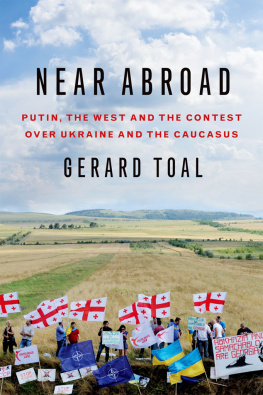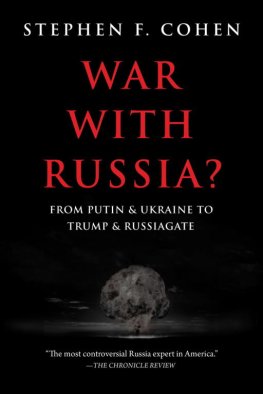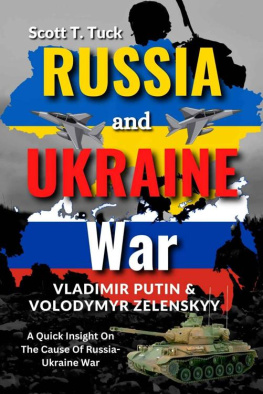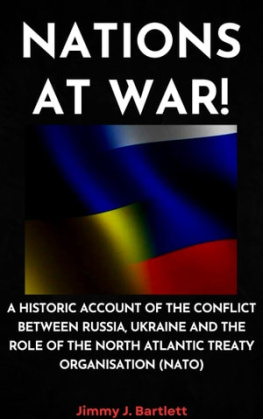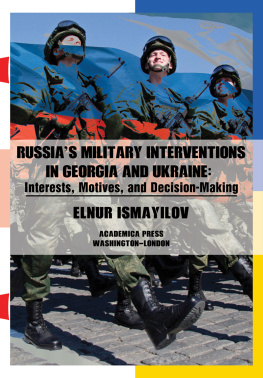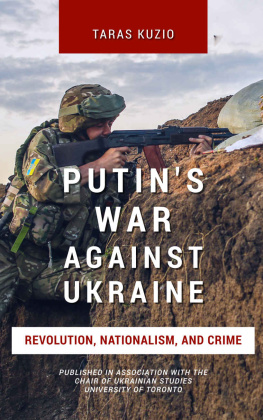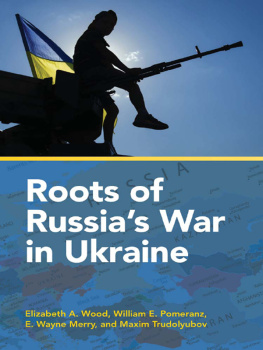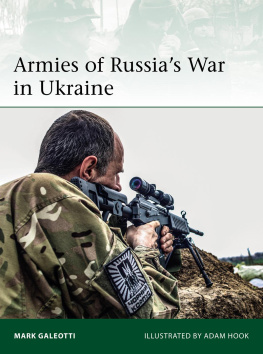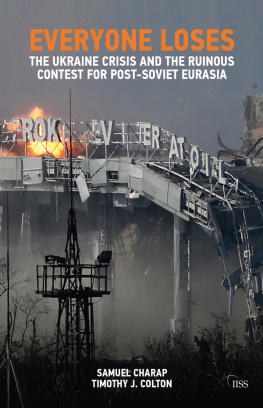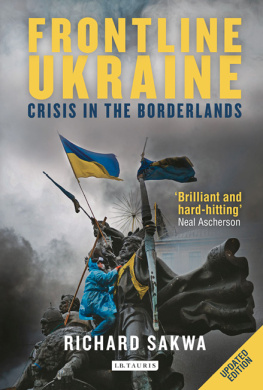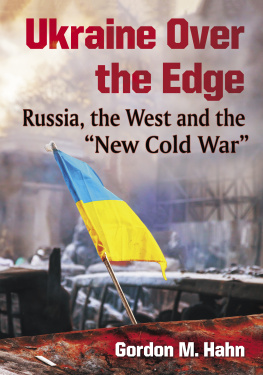NEAR ABROAD


Oxford University Press is a department of the University of Oxford. It furthers the Universitys objective of excellence in research, scholarship, and education by publishing worldwide. Oxford is a registered trade mark of Oxford University Press in the UK and certain other countries.
Published in the United States of America by Oxford University Press
198 Madison Avenue, New York, NY 10016, United States of America.
Oxford University Press 2017
All rights reserved. No part of this publication may be reproduced, stored in a retrieval system, or transmitted, in any form or by any means, without the prior permission in writing of Oxford University Press, or as expressly permitted by law, by license, or under terms agreed with the appropriate reproduction rights organization. Inquiries concerning reproduction outside the scope of the above should be sent to the Rights Department, Oxford University Press, at the address above.
You must not circulate this work in any other form and you must impose this same condition on any acquirer.
CIP data is on file at the Library of Congress
ISBN 9780190253301
eISBN 9780190253325
To my mother Bridie Toal, and my daughters Sirin and Nives
TABLE OF CONTENTS


Figures
Tables

Geographies matter. I want to recognize how much this book owes to various research institutions, disciplinary networks, locations, and people. First, I would like to acknowledge sustained research support from the U.S. National Science Foundation (NSF). A small grant for exploratory research from the Geography and Regional Science program in late 2001 (award #0203087) allowed me and my colleagues to examine the 9/11 attacks and response in Russian geopolitical culture. A 2004 grant from the Human and Social Dynamics Initiative (award #0433927) supported research on the comparative dynamics of civil war outcomes in Bosnia-Herzegovina and the North Caucasus. A 2008 grant from the same initiative (award #0827016) supported a research project on Eurasian de facto states after the independence of Kosovo. Finally, a RAPID grant (award #14-1442646) from the Political Science Program supported research on attitudes and beliefs in Russian-supported de facto states and in southeast Ukraine in the wake of the annexation of Crimea. All of these grants supported social science surveys of public attitudes as well as travel to Russia, the Caucasus, Moldova, and Ukraine to conduct elite interviews and research ground-level realities. I am extremely grateful for this support, which enabled me and my colleagues to observe how unresolved territorial questions played into deteriorating U.S.-Russian relations since 9/11.
Second, I owe a great deal to my colleagues in these research endeavors. My largest debt is to John OLoughlin (known as JohnO), my first graduate adviser more than three decades ago, and a research collaborator and friend since. Under JohnOs supervision I began to think like a political geographer and to place my upbringing in Irelands borderlands into a larger context. I have always been grateful for his initial support, most especially as my theoretical interests at the time were different from his. I completed my graduate education in political geography at Syracuse University with John Agnew, another terrific mentor. At a political geography conference in Prague in August 1991, both JohnO and I met the distinguished Russian political geographer Vladimir Kolossov for the first time. The encounter was memorable because the coup against Gorbachev had just collapsed and political life was in great flux across the Soviet Union. JohnO and Vladimir subsequently collaborated on a series of research projects in Russia, Ukraine, and Moldova. It was only after a conference in September 2001 that the three of us started working together on the NSF-supported projects listed above. I am grateful to Professor Kolossov for his passion for field research, his spirit of collaboration, and his explanations and translations.
I also want to acknowledge his colleagues in the Institute of Geography at the Russian Academy of Sciences for providing an open welcome to Russian and Soviet-era networks that facilitated our travel to conflict regions. We visited North Ossetia and other ethnic republics in the North Caucasus in 2007, Transnistria in June 2009, Abkhazia in November 2009, South Ossetia in April 2010, Nagorny Karabakh in JuneJuly 2011, and Ukraine in 2014. I would like to thank the following academics for discussions and occasional travel companionship during these visits: Andrei Gertsen, Mladen Klemencic, Nikolai Petrov, Jean Radvani, Vadim Saltikovsky, Olga Vendena, and Andrei Zubov. Thanks are due also to our research partners in the various sociological survey institutes we have used, most especially Alexei Grazdankin at the Levada Center in Moscow and Viktoriya Remmler in Krasnodar (who led our Abkhazia research), Volodymyr Paniatto and Natalia Kharchenko at the Kyiv International Institute of Sociology, Khasan Dzutsev in Vladikavkaz, Ion Jigau and CBS-AXA in Chiinu, Elena Bobkova in Tiraspol, and Gevork Poghosyan in Yerevan. Let me also acknowledge the many local officials and academics in these locations who met with us and provided their perspective and analysis. I am much wiser because of this. A special thanks to Vitaly Belezerov in Stavropol; Eldar Eldarov, Shakhmardan Muduyev, Sharafudin Aliyev, and Zagir Atayev in Makhachkala; Arthur Tsutsiev in Vladikavkaz; and Kosta Dzugaev and Alan Kharebov in Tskhinval(i).
As this book went to press, the Russian government decided to classify the Levada Center, Russias leading independent polling agency, as a foreign agent because it worked with international academics, like JohnO and I, on social-scientific research. This move is part of a longstanding effort by the state to control independent knowledge about Russian attitudes and society. Unjust on its own terms, it is also counterproductive in that fictions and preconvictions now have an easier time not only within Russia but beyond it. At the very moment we need more social science facticity, we have postfactual politics.
Third, living and working in the Washington, DC, metro region shaped my decision to organize and write this book for a general audience rather than a strictly academic one. I am very grateful to my institutional home, the School of Public and International Affairs (SPIA) at Virginia Tech in the Washington metro region, for supporting my research down the years. In particular I would like to thank Timothy Luke for years of unstinting support; the current director of SPIA, Anne Khademian; and my colleagues in the Government and International Affairs programJoel Peters, Giselle Datz, Patricia Nickel, and Ariel Ahram. I would also like to thank those students who provided research assistanceMegan Foran, Adis Maksic, Gela Merabishvili, Jeffrey Owen, and Emil Sanamyanand those whose own research efforts helped inform my thinking: Julie Ademack, David Belt, Sonya Finley, Marc Jasper, Kevin Joyce, Walter Landgraf, Matthew Osterrieder, Mirian Popkhadze, Bryan Riddle, Christopher Lee Walker, and Heather King Westerman. Among research institutions, I found regular intellectual sustenance in the Kennan Institute; George Washingtons Institute for European, Russian, and Eurasian Studies (IERES); and the Carnegie Endowment for International Peace. Thanks to them and others for hosting excellent events and speakers. I would like to thank the following individuals personally for helping me deepen my knowledge of the subject matter of this book: Kristen Bakke, Laurence Broers, Michael Cecire, Jon Chicky, Colin Cleary, Alexander Cooley, Simon Dalby, Dan De Luce, Thomas de Waal, Valery Dzutsev, Geraldine Fagan, Eugene Fishel, Julie A. George, Dorota Gierycz, Giorgi Gogsadze, Thomas Graham, Magdalena Grono, Michael Haltzel, Fiona Hill, Edward Holland, Volodymyr Ishchenko, Stephen F. Jones, Kornely Kakachia, Richard Kauzlarich, Natalie Koch, Michael Kofman, Volodymyr Kulyk, Taras Kuzio, Marlene Laruelle, Philippe Leroux-Martin, Sergey Markedonov, Derek McCormack, Wayne Merry, Lincoln Mitchell, Steven Lee Myers, Niklas Nilsson, Donnacha Beachain, Olga Onuch, Caitriona Palmer, Paul Quinn-Judge, Matthew Rojansky, Angus Roxburgh, Eugene Rumer, Richard Sakwa, Dmitri Sevastopulo, Paul Stronski, Courtney Weaver, Andrew Weiss, and Elizabeth A. Wood. Academics working on contemporary conflict owe a great deal to the tremendous courage, dedication, and professional integrity of journalists, research analysts, and photographers covering these regions. Given the relentless information war enabled by 24/7 news channels and social media platforms that now envelop conflicts, high-quality professional journalism needs our financial support more than ever.

